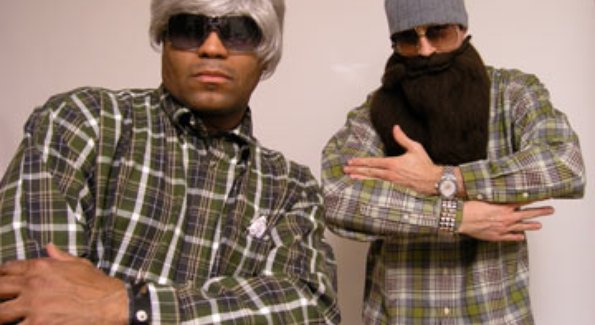Kool Keith on Writing
I read an interview with Kool Keith once where somebody asked him about his vocabulary, and he gave a list of 60 words that rhyme with orange. Every time writers want to sound like they’re saying something, they say why some rule someone else said is wrong. It’s all wrong, even the wronging of the wrong, even this paragraph.
Here’s some advice from Keith on how to do a making:

“When I say ‘I get all up in your ass,’ I mean that my rap is like combat, like anal combat.”
“Leave the 70s and the 80s alone. And the 90s.”
“I’mma stay right here with the roaches and the gorillas, I don’t want to move anywhere, I’m just gonna stay right here.”
“You been rappin for 20,000 years / And you ain’t got your fuckin deal yet? / What the fuck / Don’t take your problems out on me / And the rest of you muthafuckas / Walkin around lookin like/ some old alien niggas / Muthafucka, I pull your face off / ’bout to show you what the fuck you look like / Cause you keep it real / Too real muthafuckin broke / 2001 / Nobody was sayin that shit / when I was payin for them / fuckin hot wings / Hope you burn your fuckin lips”
“Like I’ll get open on somebody’s project like they will start their album off with 4 good beats, but they’ll make a mistake. They ll put a remake here in the middle of the album, two remakes and that turns me off right there.”
“I didn’t buy my computer yet. I heard the Internet is very powerful.”
“I seen rap come from a street pole and lamps in the street.”
“I’m not against women. I’m not against men. I just write about me telling my side of how I would say something.”
and all of the lyrics to “I Don’t Believe You”
Book-o-the-Day: The 5th Inning by E. Ethelbert Miller.
 So Shickered last night I phoned my dad who abandoned me when I was age ½. Ever been abandoned at age ½? It ½ sucks, hard. But that’s what happens, man.
So Shickered last night I phoned my dad who abandoned me when I was age ½. Ever been abandoned at age ½? It ½ sucks, hard. But that’s what happens, man.
E. Ethelbert Miller writes some solid poems (though not here–this is a memoir). He is also an activist. He has helped changed things, at times.
E. Ethelbert Miller has an idiosyncratic name and he is very aware of the fact.
E. Ethelbert Miller is frightened he will die and not be special. None of us are special. E. Ethelbert Miller knows this and the day he dies I will have to get my coffee, you know, because I need my coffee in the morning. If I die first E. Ethelbert Miller will get his coffee.
December 19th, 2009 / 3:25 pm
Oh! Canada!
Hello, HTML Giant, from sub-zero Canada! I’m happy to be on board.
So yesterday, I packed all my stuff in a car and drove up here. And now, here I am, in Canada. What’s with this place? What’s going on here? Free health care? Clean cities? Really, it can’t be trusted. I mean, can people who choose to live in a place this cold be trusted? (Obviously, I’ve chosen to live here & I know I’m untrustworthy. Logic then tells me that anyone else who makes this decision also can’t be trusted.)
And what’s with the writing scene here? I mean, sure, Christian Bok & Jeff Parker, among a handful of unknown writers like Michael Ondaatje, are here, but who else? What else?!? Give me hope, HTML Giant!
Literary Doppelgangers

Joey Greco

Brian Chase
I really like Cheaters, the show that catches people cheating on their lovers. Each segment climaxes in some parking lot or rank 2BR apt — the sadness of wanting to fuck something better, of escaping one’s unrewarding life. There’s something stupid yet profound about being cheated on, the lung popping sadness, the imperative rebirth that one must go through. I bet host Joey Greco was cheated on once; nothing can mask such humiliated endurance and tempered indignation. Cheating is like parking in the handicap spot, it’s just bad, even in a our pluralistic world. I bet a lot of ladies have cheated on their man with Yeah Yeah Yeahs drummer Brian Chase [see also this]. Sex is about timing, being 3/4 the way there in 3/4 time (I tried 6/8 once and pulled a muscle). Rock n’ roll will always be sexy, even when there’s a psycho lady in the way.
Gee, This is Awkward
 Your piece in Lit Mag X was all Oil Glow/Lick-Stick Skillz. I fell in love. So I asked you to submit to a Mag I edit, Lit Y. You did, kind soul. But that piece is only good, not Oil Glow/Lick-Stick Skillz. Now what do I do? Why?
Your piece in Lit Mag X was all Oil Glow/Lick-Stick Skillz. I fell in love. So I asked you to submit to a Mag I edit, Lit Y. You did, kind soul. But that piece is only good, not Oil Glow/Lick-Stick Skillz. Now what do I do? Why?
Small Press Distribution’s Top-Selling Poetry of 2009
Thanks to John Sakkis for the heads up. Click here for the full list of SPD’s Top Selling Poetry of 2009, and click after the break for the Top 20.
1 FACE by Sherman Alexie (Hanging Loose Press)
2 BREAKING POEMS by Suheir Hammad (Cypher Books)
3 ZAATARDIVA by Suheir Hammad (Cypher Books)
4 THE MAN SUIT by Zachary Schomburg (Black Ocean)
5 CLAMPDOWN by Jennifer Moxley (Flood Editions)
6 THE BATTLEFIELD WHERE THE MOON SAYS I LOVE YOU by Frank Stanford (Lost Roads Publishers)
7 YOU ARE A LITTLE BIT HAPPIER THAN I AM by Tao Lin (Action Books)
8 RADI OS by Ronald Johnson (Flood Editions)
9 SCARY, NO SCARY by Zachary Schomburg (Black Ocean)
10 HUMANIMAL: A PROJECT FOR FUTURE CHILDREN by Bhanu Kapil (Kelsey Street Press)
Writing Prompt: Vanish
 Say you’re writing about someone who is not around. Say you are writing about someone that some others have lost in one way or another. (There are so very many ways of losing someone.) As I see it, you have two ways of approaching this.
Say you’re writing about someone who is not around. Say you are writing about someone that some others have lost in one way or another. (There are so very many ways of losing someone.) As I see it, you have two ways of approaching this.
The first image illustrates one way of doing it. (Image by Charles Cohen.) Someone can disappear and leave a gaping hole shaped just like themselves.

This second image is by a Seattle artist named John Haddock. It is also a picture of someone who is not there. Haddock takes images from the web—pornographic images—and erases the nude figure from the image, replacing it by drawing the patterns of the bedspread, the color of the wall, the features of the room. After the character has been erased, the hole has been filled in.
Try them both. Write something about a person who is gone. In one version, leave the gaping hole. In the other, fill the hole in so it is almost like the person was never there.
HOW TO DO THINGS WITH WORDS

this is john austin
one of the most important books to me is HOW TO DO THINGS WITH WORDS by j.l. austin. it is a book about language and how certain utterances transcend the simple description of things or the world. after reading this book, it is easier to understand other people and the import of certain conversations. the book is based on lectures austin gave at, i think, harvard university. i am going to read it for a third time and try to provide a summary and critique of each lecture in the upcoming weeks. if you a familiar with language philosophy, performative utterances or how derrida has used these theories to augment his own, feel free to help me. the main thrust of the book is that in addition to describing things (constative language, or “my shirt is red.”), language can also produce realities. for instance, when saying “i do” at a wedding, if applied to the right person, in the right situation, with no obstacles denaturing the situation, an effect is produced by the utterance. forgiveness is another example. i think many of the ideas in the book could be applied to comment threads here. for instance, if i call someone a “dipshit” in a comment thread, on account of not knowing the correct placement of a comma, and then i apologize, i have used a “behabitive” utterance. a behabitive characterizes behavioral responses. in the moment i apologize, i place myself and the other person in a situation which can either be, according to austin, not true or false, but “felicitous” or “infelicitous” based on the correct execution. my apology must be worded in such a way as to signify true regret, i must not be sarcastic, i must not whisper it quietly or not type it, and the other person must accept it, etc. i can’t remember if i wrote a post on this before, but i will try to do it more in depth here. i think this kind of book is really helpful for dealing with other people, as it uncovers the unstated context for many “language games.” thanks for reading this.
We’re giving away copies of One Hour of Television (Kristina Born), We Take Me Apart (Molly Gaudry) and Inconceivable Wilson (JA Tyler). If you want in on the goodness, go here.

